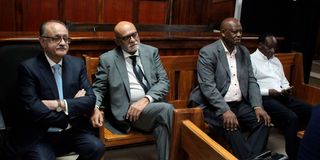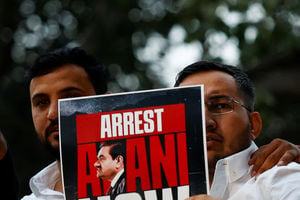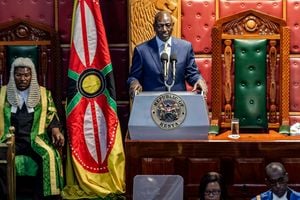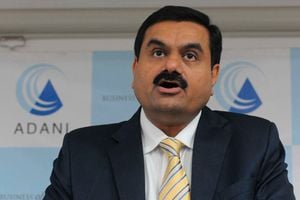Breaking News: Former Lugari MP Cyrus Jirongo dies in a road crash

The revocation of the Adani deals by President William Ruto turned focus on the possible cost implication that may arise from the breach of contract.
President William Ruto’s cancellation of two multi-billion tenders involving the controversial Adani Group received a standing ovation from MPs despite previous similar decisions, turning out to be an expensive undertaking for Kenyan taxpayers.
Botched contracts have in the past come with cost implications, which have seen taxpayers pay billions of shillings in claims.
There are already fears taxpayers could incur costs for one of the signed contracts.
Adani Energy Solutions had in October signed a Sh96 billion deal with Kenya Electricity Transmission Company (Ketraco) to build and operate four transmission lines and two sub-stations for 30 years.
Although the details of the agreement have not been made public, most of them contain a clause spelling out fines in the event one of the parties breaches the contract.
Some of the previous botched agreements that have cost the taxpayers billions include the shadowy Anglo Leasing contracts, Ken-Ren Chemical and Fertiliser Plant and Greenfield Passenger Terminal Complex at Jomo Kenyatta International Airport (JKIA).
The country is also in negotiations to pay off contractors in the botched Sh108 billion Arror, Kimwarer and Itare dams.
The fears of a possible cost implication in the Adani deals were confirmed by the remarks of Treasury Cabinet Secretary John Mbadi, who said the country could be at risk of paying fines.
However, he assured Kenyans that no money would be lost as a result of the cancelling of the JKIA deal.
Surchage officials
The Adani Group was still in the process of entering another Sh238 billion deal with Kenya Airports Authority (KAA) for the expansion of JKIA.
“The Ketraco deal had progressed. We will check if there is any possibility of exposure. However, for the JKIA, there is no money lost. It was still at the initial stages, as I had told MPs,” said Mr Mbadi.
Politician Jimi Wanjigi, a critic of the Kenya Kwanza administration, said President Ruto insisted that despite the cancellation of the deal in the Transport and Energy ministries, there are still cost implications for Kenyan taxpayers.
“Any costs incurred or preferred on the taxpayer shall be surcharged to the officials responsible for this humongous corrupt disaster of a PPP (public-private partnership),” said Mr Wanjigi.
He said since Kenya had already entered into contracts, a breach of the agreements must come with cost implications.
Anglo Leasing scandal
In the Anglo Leasing contracts, the taxpayers coughed up Sh1.4 billion to settle a claim arising from one of the dubious 18 security-related contracts.
Although conceived in 2001, during the late President Daniel arap Moi’s final year in office, the claim was paid by the Jubilee government of President Uhuru Kenyatta.

From left: Rashmi Kamani, Deepak Kamani, David Onyonka and Dave Mwangi in a Milimani court, Nairobi.
Mr Kenyatta, while serving as the Opposition Leader in Parliament during the late President Mwai Kibaki’s regime, had made remarks against honouring payments related to the contracts.
He would, however, make a U-turn after ascending to power to push for the payments.
In 2014, the National Treasury relied on a presidential fiat when it drew Sh1.4 billion from the Consolidated Fund to settle the contentious claims by Anglo Leasing firms.
Then Treasury PS Kamau Thugge told a parliamentary committee how his office released the payment on President Kenyatta’s directive.
The directive was communicated through an email from then-State House spokesperson Manoah Esipisu.
“I had the consent of the Controller of Budget and a directive from the President,” Dr Thuge told the parliamentary Public Accounts Committee.
The money included principal sums and interests accrued on a sum agreed by parties to the dispute following a court decision in favour of the claimants in Geneva and London.
First Mercantile Security Corporation was paid Sh722 million for the termination of a contract to supply telecommunication equipment to Postal Corporation, while Universal Satspace was awarded Sh705 million for a contract to supply bandwidth spectrum and service it for 10 years, which was also terminated.
The contracts were part of the 18 projects, for which the State paid Sh6.8 billion for completed contracts and cancelled four valued at Sh18.9 billion that were yet to begin, recovering the Sh1 billion it had paid upfront.
Costly ghost fertiliser
In the ghost fertiliser plant, the taxpayers lost Sh6.33 billion. The government paid Sh2.48 billion to a Belgian bank towards the settlement of government-guaranteed debts incurred in 1970.
Kenyan taxpayers had earlier paid Sh3.9 billion to the governments of Australia and Belgium to guarantee the construction of the fertiliser plant in Changamwe, Mombasa.
The obligation arose from a case filed at the Court of Arbitration of the International Chamber of Commerce by the Belgian bank known as Ducroire. The court found the government of Kenya liable as guarantor.
Ken-Ren was a joint ownership between Kenya and N-Ren Corporation in which the two entered into several financing and equipment procurement contracts with various Australian and Belgian banks and suppliers. The government was the guarantor.
In the botched tender to build the second terminal at JKIA, two Chinese firms – Anhui Civil Engineering Group (ACEG) and China Aero Technology Engineering International Corporation (Catic) had submitted a claim of Sh17.6 billion to Kenya Airports Authority (KAA).
The firms wanted KAA to pay Sh2 billion for the preparation of the bill of quantities, Sh2.4 billion in extra costs and Sh708 million being 16 per cent of value added tax (VAT).
The contractors also slapped KAA with a Sh500 million claim in interest and penalties for delayed payment of VAT. They also sought Sh5.6 billion comprising the balance of the contract of the bill of quantities, extra cost claim, VAT, and interest and penalties, bringing the total claim to Sh17.6 billion.
Kenya, however, entered into a mediation with the firms and a new settlement of Sh8.9 billion was settled on.
Arror and Kimwarer dams
In the Sh108 billion Arror, Kimwarer and Itare dams, Treasury had in 2021 entered secret negotiations to pay off contractors in a bid to qualify for insurance compensation for the cancelled projects.
The negotiations were called after the Italian state-owned insurer, SACE Gruppo CDP, told the Kenyan government that it must pay contractors hired to build the multi-billion shilling dams before it can receive compensation for default on the mega projects.
“Therefore, as a preliminary and necessary step to implement any potential solution, it is necessary to have any overdue amount under the SACE facilities repaid beforehand, in order to restore the consequent claims/losses occurred under the SACE insurance policies,” SACE told Kenya in a May 10, 2021 letter seen by Nation.
The Kimwarer project was scrapped in 2019 for being technically and commercially unfeasible, and some of the loans in relation to the project were subsequently scrapped. All the three projects collapsed after the contractor, Italy’s CMC Di Ravenna, collapsed under the weight of debts.
The Italian firm had also made a claim of Sh12.6 billion for alleged unlawful termination of the Arror and Kimwarer construction contracts.












